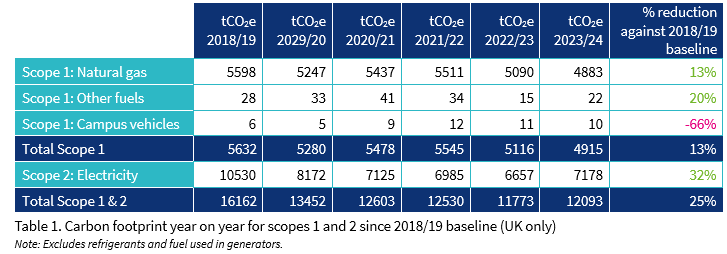Carbon Management
Queen Mary is committed to supporting the Government’s ambition of reaching net zero by 2050, both by mitigating the net-negative impacts of our operations and accelerating the net-positive contributions we make through education, research and engagement.
Queen Mary continues to actively support and engage locally with Tower Hamlets Council climate action initiatives. This includes being a partner in the Climate Partnership Network and subgroups, spanning biodiversity, innovation, leadership and research.
In 2023/24, Queen Mary achieved a 25 per cent carbon reduction against the 2018/19 baseline for scope 1 and 2 carbon emissions (emissions related to energy and fuel use in our directly managed buildings and campus vehicles). There has been a 32 per cent reduction in scope 2 (indirect emissions from electricity production) and a 13 per cent reduction in scope 1 emissions by 2023/24 against the 2018/19 baseline as shown in Table 1. This significant scope 2 reduction has been possible due to ongoing investment into energy reduction projects that have been focused on our top energy consuming buildings, BMS optimisation works and time scheduling adjustments, engagement campaigns and the decarbonisation of the grid.

A new carbon reduction target to reduce scope 1 and 2 emissions (tCO2e) by 18% by end of 2027/28 against 2023/24 emissions has been published in our new Environmental Sustainability Action Statement (2025/26–2027/28) [PDF 2,535KB].
We are also looking to improve the Queen Mary Heat Decarbonisation Plan March 2022 [PDF 7,849KB] drafted in 2022 to make it more useful and specific to our buildings, as well as develop a broader carbon management plan.
Queen Mary operates several halls of residence that offer accommodation on campus or a short distance away. Carbon emissions from residences account for around 12% to 15% of our total scopes 1 and 2 emissions (see table 2).
